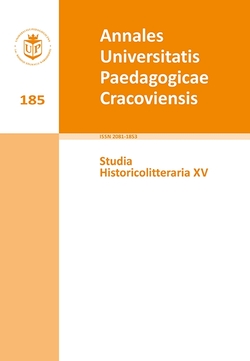Powstanie Warszawskie i obóz Durchgangslager 121 w Pruszkowie widziane oczami wysiedlonych mieszkańców Warszawy i okolic. Doświadczenia indywidualne a współczesna pamięć społeczna
Hauptsächlicher Artikelinhalt
Abstract
Warsaw Uprising and Durchgangslager 121 in Pruszków as seen by deported citizens. Individual experiences vs contemporary public history
Warsaw Uprising 70th anniversary is a time to remember that the events which took place in 1944 should be considered in full context, without skipping any aspects. So far forgotten were the civilians of the Warsaw uprising and what happened to them; however their fate did not stop at the signing of capitulation. What people mainly remember from the Warsaw uprising is Durchgangslager 121 in Pruszków, the transition camp to which all the inhabitants of the burning capital city were sent. This paper presents and analyzes sample protocols, relationships, testimonies, memories and documented and archived diaries since August 1944 to today. The image emerging from them, even though the facts, people and events concur, isn’t a homogeneous one. It’s composed of many bits of memories - individual memories, collective memory, childhood memories, or the memories of the residents of particular neighborhoods in Warsaw. What characterizes these documents? When did they appear? What makes war narratives created over the period of 70 years different? How is the third generation’s contemporary collective memory being shaped? The attempt to answer these questions is the starting point for future large-scale interdisciplinary researches.
Key words: The Warsaw uprising; deportation of the people of Warsaw; transition camp Durchgangslager (Dulag) 121 in Pruszków; historical memory; war memories;
Downloads
Artikel-Details

Dieses Werk steht unter der Lizenz Creative Commons Namensnennung - Nicht-kommerziell - Keine Bearbeitungen 4.0 International.
URHEBERRECHTE
Der Herausgeber der „AnnalesUniversitatisPaedagogicaeCracoviensis. StudiaHistoricolitteraria” ist zur Nutzung und Verbreitung aller in der Zeitschriftveröffentlichten Materialien auf Grundlage eines nicht ausschließlichen, zeitlich unbeschränkten Lizenzvertrags befugt, der im Voraus unbefristet mit jedem/r Autor/in des jeweiligen Werks für die im betreffenden Vertrag vereinbarten Nutzungsbereiche abgeschlossen wird.
POLITIK DES OFFENEN ZUGRIFFS
Die „AnnalesUniversitatisPaedagogicaeCracoviensis. StudiaHistoricolitteraria” sind eine Fachzeitschrift mit freiem Zugriff, dessen voller Inhalt kostenlos für Nutzer und Einrichtungen auf Grundlage einer nicht ausschließlichenCreativeCommons-Lizenz (CC BY-NC-ND 4.0) verfügbar ist. Die Nutzer/innen können die Artikel in dieser Zeitschriftohne vorherige Zustimmung des Herausgebers oder des/r Autors/in lesen, herunterladen, Kopien anfertigen, verbreiten, drucken oder zu Volltexten verlinken, insofern die Quelle des Zugriffs und der/die Autor/inder jeweiligen Publikation angegeben wird. Dies ist mit der BOAI-Definition des offenen Zugriffs konform (http://www.soros.org/openaccess).
Literaturhinweise
Exodus Warszawy. Ludzie i miasto po Powstaniu 1944, red. E. Borecka, M. M. Drozdowski, J. Górski, J. Kazimierski, Warszawa 1992.
Majewska-Luft B., Gdy stanął czas dla Warszawy, „Przegląd Pruszkowski” 1994, nr 2.
Serwański E., Dulag 121 – Pruszków. Sierpień – październik 1944 roku, Poznań 1946.
Sławińska D., Kiedy kłamstwo było cnotą. Wspomnienia z pracy w obozie przejściowym w Pruszkowie 2 IX 1944–16 I 1945, Białystok 2006.
Wypędzeni z Warszawy 1944. Losy dzieci, red. I. Maliszewska, Warszawa 2007.
Zaborski Z., Durchgangslager 121. Niemiecka zbrodnia specjalna, Pruszków 2010.
Zbrodnia niemiecka w Warszawie 1944 r. Zeznania – zdjęcia, red. E. Serwański, I. Trawińska, Poznań 1946.
Netografia
Boenisch M., To, co łatwe do zobaczenia, dulag121.pl, www.dulag121.pl/index.php?cmd=aktualnosci&opt=pokaz&id=203 [dostęp: 30.11.2014].
Bojarska K., Obcy w „Tworkach”, obcy w „Achtung Zelig” – próba rekonstrukcji strategii literackich i wizualnych w kontekście Zagłady i post-pamięci, badanialiterackie.pl, www.badanialiterackie.pl/obcy/103-111_Bojarska.pdf [dostęp: 19.05.2013].
Wykresy
Praga A., autorskie badania ankietowe młodzieży z kwietnia 2011 r. i października 2014 r.
